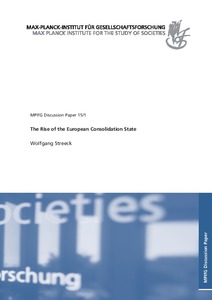The rise of the European consolidation state
"The rise of the consolidation state follows the displacement of the classical tax state, or Steuerstaat, by what I have called the debt state, a process that began in the 1980s in all rich capitalist democracies. Consolidation is the contemporary response to the "fiscal crisis of the stat...
| Main Author: | |
|---|---|
| Institution: | ETUI-European Trade Union Institute |
| Format: | TEXT |
| Language: | English |
| Published: |
Köln
2015
MPIfG |
| Subjects: | |
| Online Access: | https://www.labourline.org/KENTIKA-19113797124919319799-The-rise-of-the-european-conso.htm |
| Summary: | "The rise of the consolidation state follows the displacement of the classical tax state, or Steuerstaat, by what I have called the debt state, a process that began in the 1980s in all rich capitalist democracies. Consolidation is the contemporary response to the "fiscal crisis of the state" envisaged as early as the late 1960s, when postwar growth had come to an end. Both the long-term increase in public debt and the current global attempts to bring it under control were intertwined with the "financialization" of advanced capitalism and its complex functions and dysfunctions. The ongoing shift towards a consolidation state involves a deep rebuilding of the political institutions of postwar democratic capitalism and its international order. This is the case in particular in Europe where consolidation coincides with an unprecedented increase in the scale of political rule under European Monetary Union and with the transformation of the latter into an asymmetric fiscal stabilization regime. The paper focuses on the developing structure of the new consolidation regime and its consequences for the relationship between capitalism and democracy." |
|---|---|
| Physical Description: | 26 p. Digital |

